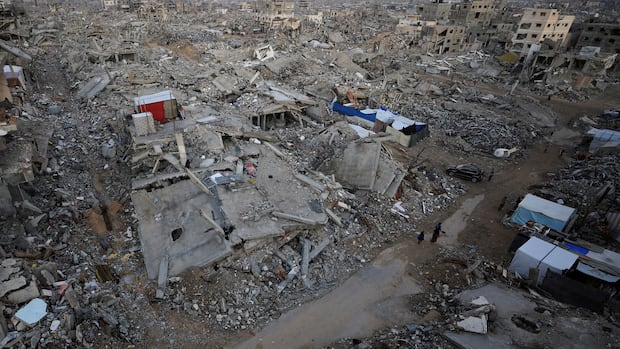Hundreds of shipments of explosives and fighter jet components have made their way from Canada to Israel by passing through the U.S. over the last two years, a new report by a group of four NGOs alleges, examining export data and U.S. Department of Defence contracts.
"These exports are bypassing all of Canada’s export controls because of the way they’re routed through the U.S., and nonetheless, they’re still making it to Israel and directly supporting Israel’s capacity to carry out war crimes in Gaza," said Rachel Small, a Canadian organizer with the World Beyond War activist group.
The report outlines 34 shipments of military aircraft components between April 2024 and August of this year that it says were sent to U.S. facilities belonging to Lockheed Martin, the manufacturer of the F-35 fighter jet, before being transferred "just a few days later" to Israel.
The report also mentions 360 additional aircraft part shipments to an F-35 assembly facility in Fort Worth, Texas, 150 shipments of explosives from two Quebec facilities belonging to General Dynamics to the U.S., and 433 shipments of TNT sent from a manufacturer in Poland through to the U.S., and eventually Israel, after transiting via Quebec's Port of Saguenay.
CBC News obtained an advance copy of the report, which will be published on Tuesday morning. Using commercially available export data and U.S. Defence Department contracts, the activists tracked the routes of Canadian-made goods sent to American facilities, then followed shipments with "identical or similar shipping labels" from those facilities to Israeli military manufacturers.
"While it is impossible to confirm exactly how Israeli military facilities used these particular shipments of F-35 parts upon receiving them, it is worth noting that modern fighter jets like F-35s require extensive maintenance to remain functional," the document notes.
"For me, what that looks like is providing Israel with the repair and the replacement parts that it needs immediately … to keep its jets in the air," Small said.
 Rachel Small, of World Beyond War, is seen here speaking at a protest in Toronto in May 2024. Her group is one of four behind a report examining Canadian arms shipments ending up in Israel after going to the U.S. (Chris Glover/CBC)Report exposes what it calls U.S. 'loophole'
Rachel Small, of World Beyond War, is seen here speaking at a protest in Toronto in May 2024. Her group is one of four behind a report examining Canadian arms shipments ending up in Israel after going to the U.S. (Chris Glover/CBC)Report exposes what it calls U.S. 'loophole' Global Affairs Canada said in a statement that "it has not approved any new permits for items to Israel that could be used in the current conflict in Gaza since Jan. 8, 2024" — a stance it has maintained whenever the question of sending arms to Israel has come up in the last two years.
It also reiterated it has suspended "approximately 30 export permits for items destined to Israel that could have conceivably later been incorporated into items that could be used in that conflict."
These same four NGOs had also released a report earlier this year that suggested Canadian goods described as either military weapon parts or ammunition by the government of Israel were directly entering the country.
In this new report, the researchers said Canadian companies are using a "significant legal loophole in Canada’s Export and Import Permit Act and regulations," pointing out how most goods sent to the U.S. are not subject to an export-control regime.
"Consequently, once these arms enter the U.S., they are untraceable from the standpoint of [Global Affairs Canada]," the report said.
"This faulty system creates a loophole through which the Canadian government distances itself from the final use of these exports, thus absolving themselves of responsibility for any subsequent human rights violations perpetrated using those military goods.”
Canadian components shipped to Israeli Defence Ministry, airbase: reportExamples of aircraft parts manufactured in Canada and eventually sent to Israel include power and thermal management controllers from Honeywell Aerospace in Mississauga, Ont.
The report documents 174 shipments sent to Lockheed Martin’s facilities in Fort Worth, Texas, and Greenville, S.C., between April and November 2024, with one then sent to Lockheed Martin in Tel Aviv, as well.
CBC News tracked one shipment that was picked up in Fort Worth on Nov. 12, 2024, and went to an address in Nevatim, which corresponds to an air force base in Israel, one week later, on Nov. 19.
 An Israeli F-35 aircraft is seen on the runway at Ovda military airbase, in southern Israel, on Nov. 11, 2019. (Amir Cohen/Reuters)
An Israeli F-35 aircraft is seen on the runway at Ovda military airbase, in southern Israel, on Nov. 11, 2019. (Amir Cohen/Reuters)The report said another Canadian manufacturer, Héroux-Devtek in Laval, Que., shipped uplock assemblies — mechanical systems "used on aircraft utility doors such as landing gear bays" — to the same Fort Worth, Texas, facility between April 2024 and August 2025, with 11 shipments then going to Israel over the course of that time, as well.
CBC News also tracked one shipment that went from an address in Marietta, Ga., — where Lockheed Martin has sprawling facilities — to Tel Aviv in the course of about a month, from July to August of this year.
The report noted deliveries at Israel’s Defence Department, as well as Lockheed’s Tel Aviv facility.
Report authors call for complete embargoAs for the explosives, the report suggested they were sent from General Dynamics' plants in Valleyfield and Repentigny, Que., to U.S. army ammunition plants that make "2,000-pound MK-84 bombs, 155mm artillery shells and 120mm tank rounds for export to Israel."
"The Valleyfield plant is the sole North American supplier of the M21A2 triple-base propellant, critical to the hundreds of thousands of U.S.-made 155mm artillery shells that Israel has deployed in its assault on Gaza," the report said.
It further said the TNT shipped from Poland, from a company named Nitro-Chem, also ended up at U.S. army plants, after getting "trucked on Canadian highways" once it arrived at the Port of Saguenay, Que. The TNT was used to produce MK-84s, as well as "I-2000 penetrator bombs," the report said.
"We are seeing these bombs continuing to fall from these same fighter jets," said Boutaina Chafi of the Palestinian Youth Movement, another of the groups involved in compiling the data. "Perhaps at a slightly decreased volume than we were seeing two months ago, but that's of little consolation, frankly, to our Palestinian friends."
The four groups are calling for the Canadian government to "completely halt the flow of weapons and military components to Israel, both directly and indirectly via the U.S. loophole."
They will be presenting their findings at a news conference on Tuesday morning, alongside opposition NDP MP Jenny Kwan, who has a private member's bill tabled seeking to end U.S. exemptions for arms control permits.
 A protester holds a sign up just outside of the General Dynamics plant in Repentigny, Que., on Sept. 6, 2024. The company is mentioned in a report about explosives being sent to Israel via the U.S. (Ivanoh Demers/Radio-Canada)
A protester holds a sign up just outside of the General Dynamics plant in Repentigny, Que., on Sept. 6, 2024. The company is mentioned in a report about explosives being sent to Israel via the U.S. (Ivanoh Demers/Radio-Canada)CBC News reached out to Lockheed Martin, General Dynamics, as well Nitro-Chem for comment.
Lockheed Martin deferred questions to the Canadian and U.S. governments.
"Questions regarding foreign military operations are best addressed by that foreign government, and discussions about foreign military sales are best addressed by the U.S. and Canadian governments, " a spokesperson said in an emailed statement.
Citing the "sensitive nature of our company's operations" and the "current geopolitical situation," Nitro-Chem declined comment on any specific contracts.
"We do not provide information on the volume of production, as well as details concerning the countries with which the company co-operates," a spokesperson said in an email.
"All of our company activities comply with applicable international law. Our operations are subject to the to supervision by relevant state institutions, both in terms of exports and compliance with international regulations."











